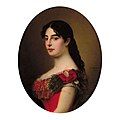Stevan Todorović
Stevan Todorović | |
|---|---|
 | |
| Born | 1832 |
| Died | 1925 |
| Movement | Romanticism, later Academism |
Stevan Todorović (Serbian Cyrillic: Стеван Тодоровић; Novi Sad, 1832–Belgrade, 1925) was a Serbian painter and the founder of modern fencing and Sokol movement in Yugoslavia.[1][2]
Biography
[edit]Born in Novi Sad, Todorović moved in 1839 to Szeged, where he completed elementary school and five grades of high school.[3] In 1850 he relocated to Vienna to study art. After several years in Vienna, he settled in Belgrade, where he was engaged with a gymnastic and fencing club, as well as theatre. He also ran a successful drawing school.[4]
In 1864, he married painter Poleksija Todorović (née Ban), who was his wife for over sixty years.[4][5] They worked together on various projects in churches across Serbia, including iconostases in Church of the Nativity of the Virgin in Bogatić and in the Holy Trinity Church in Negotin.[6][7]
He was a correspondent and war painter for a number of domestic and foreign newspapers during the Serbian-Turkish Wars (1876–1878), and became known as the founder of war painting in Serbia. From the Balkan Wars, and later World War I, this was no longer an individual occupation but a task subject to state and military regulations.[citation needed]
Todorović was close to the Obrenović royal house. He made portraits of almost all members of the royal family, including Natalie of Serbia; his portrait of her helped in making her the "Serbian Mona Lisa".[8]
He exhibited his artworks as a part of Kingdom of Serbia's pavilion at International Exhibition of Art of 1911.[9]
In the course of his long life, he created art under various visual poetics, chiefly Romanticism[4] to Academicism.[10] His best works were carried out in the Romantic spirit.[10] His extensive artistic legacy consists of portraits, religious and historical paintings, landscapes, and numerous studies and drawings.[10] Much of his artistic activities is related to Serbia and Belgrade in which cultural and social life he actively participated.[10] He opened the first art school in Belgrade where youngsters learned drawing, singing, fencing, and gymnastic exercises.[10] Owing to a long life and extraordinary tenacity and hard work, he managed to create a rich painting opus.
Also, Stevan Todorović's work can be found in the collection of Milan Jovanović Stojimirović who bequeathed a large number of paintings, sketches, and artifacts to the Art Department of the Museum in Smederevo.[11]
Gallery
[edit]-
Death of Hajduk-Veljko, 1850
-
Portrait of Milan Đ. Milićević, National Museum of Serbia, 1866
-
Portrait of Nićifor Dučić, 1874
-
Portrait of king Milan Obrenović, 1883
-
Reina Natalija de Serbia, 1883
-
Polekonia Tolorovitschka, 1889
-
Sabor u Prizrenu, 1899
-
Postriženje Svetog Save, 1907
-
Portrait of composer Kornelije Stanković, 1920
-
Portrait of Mihailo Obrenović
See also
[edit]References
[edit]- ^ "MAČEVANJE U BEOGRADU". www.macevanje.org. Retrieved 2019-08-15.
- ^ istoriju, MK Fondacija Srpski Legat. "Rođen je slikar i akademik Stevan Todorović".
- ^ "Stevan Todorovic". Galerija prodaja slika Beli Andjeo Beograd GLAVNI SAJT slike slikar cena (in Serbian). Retrieved 2024-11-01.
- ^ a b c "Arte - Stevan Todorović - Biografija". www.arte.rs. Retrieved 2019-08-15.
- ^ Димитријевић, Милица. "„Полексија, волим Вас" у Дому Јеврема Грујића". Politika Online. Retrieved 2024-10-31.
- ^ "Crkva Presvete Bogorodice u Bogatiću". Bogatić (in Serbian). Retrieved 2024-10-31.
- ^ "Споменици културе у Србији". spomenicikulture.mi.sanu.ac.rs. Retrieved 2024-10-31.
- ^ Hadži-Minić, Katarina (2019-04-17). "Ko je bila 'Srpska Mona Liza'? Lepa i tragična srpska kraljica Natalija Obrenović". Pokazivač (in Bosnian). Retrieved 2019-08-16.
- ^ Elezović, Zvezdana (2009). "Kosovske teme paviljona Kraljevine Srbije na međunarodnoj izložbi u Rimu 1911. godine". Baština. 27.
- ^ a b c d e Galerija Matice srpske.
- ^ The Legacy of Milan Jovanovic Stojimirovic in the Art Department of the Museum in Smederevo.
Sources
[edit]- Veljko Petrović; Zora Simić Milovanović (1950). Steva Todorović: 1832-1925 : izdanje Umetničkog muzeja, Beograd i Matice srpska, Novi Sad, 1950. Umetnički muzej.
External links
[edit]- Galerija Matice srpske. "EПОХА РОМАНТИЗМА". Galerija Matice srpske.










